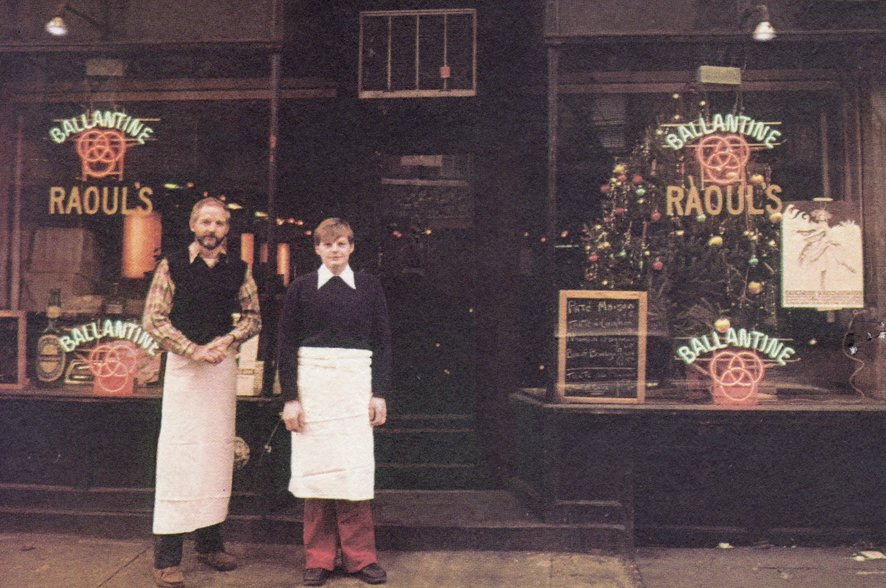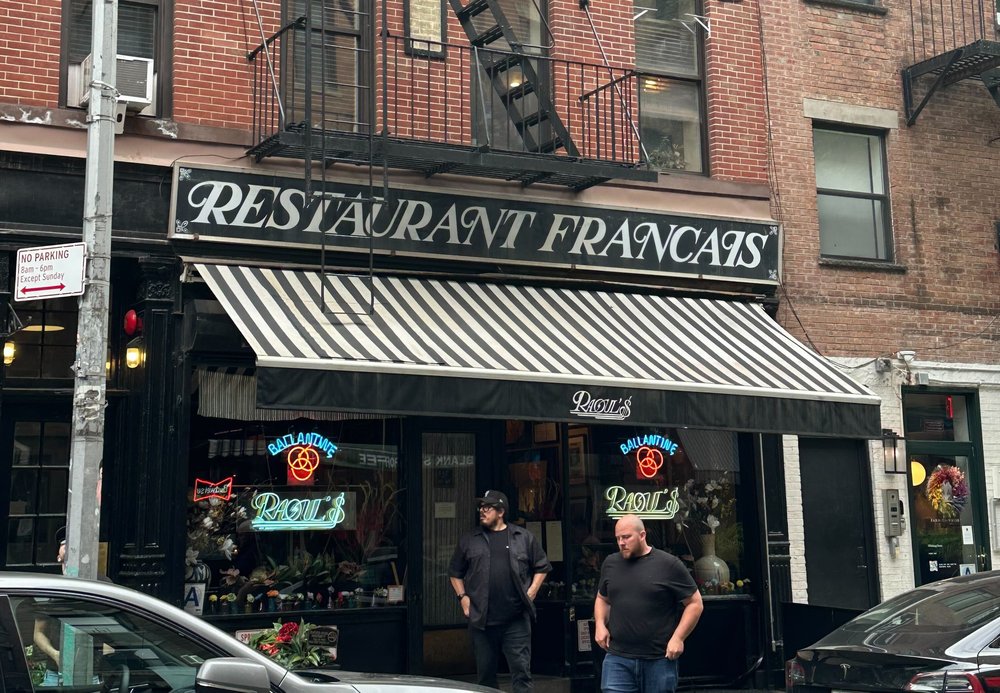A new documentary looks at 50 years of iconic SoHo restaurant Raoul’s
June 13, 2025, 2:26 p.m.
“Raoul’s: A New York Story” is screening through Sunday at the Tribeca Film Festival.

A documentary about iconic SoHo restaurant Raoul’s is screening in New York City through Sunday after its world premiere Monday at the Tribeca Film Festival.
“Raoul’s: A New York Story” highlights the beloved French bistro Raoul’s, which opened 50 years ago in SoHo.
Back in 1975, French brothers Serge and Guy Raoul served simple bistro classics to a collection of artists, models and actors who were thrilled to have a restaurant in an area that was still mostly empty warehouses.
SoHo has changed, but Raoul's remains largely the same. Karim Raoul, son of owner Serge Raoul, became a part-owner in the restaurant after his father suffered a stroke.

Karim's dream had been to be a filmmaker. In fact, he says at one point in the documentary that he wanted nothing to do with Raoul's.
That's until one day, when he was shooting a film in Indonesia, and got a phone call that changed his life.
“My father had just had a stroke,” he said. “I thought that, ‘Well, there's a couple issues I'd like to iron out before I go back.’ I thought I'd be dealing with them for a year or two. Here we are, 15 years later.”
Though Karim stepped away from filmmaking to run Raoul’s, he achieved his dream of making a movie with “Raoul’s: A New York Story.”
Directors Karim Raoul and Greg Olliver discussed their film on a recent episode of “All of It” with Alison Stewart. An edited version of their conversation is below.
Alison Stewart: What was the original intent of the documentary?
Raoul: There was no intention. Greg and I were working on hotel videos together, and we would rent camera packages and we'd return the cameras on Monday. On the weekends, we'd have all this camera gear. I would take the camera gear and do a couple interviews or just do some shooting at the restaurant just to practice. That's how it built up.
Greg, when was the first time you went to Raoul's?
Olliver: I met Karim around 2010. I was working on a documentary about Lemmy of the band Motörhead. I met Karim when he was helping me on that. We returned our gear, and then he's like, "You want to get dinner at my dad's restaurant?" I'd never heard of Raoul's before. I think I got a steak au poivre. All of a sudden, I was like, "I like this guy."
At one point in making the documentary, Greg, that you realize, maybe Karim needs some help. How can I get involved?
Olliver: It wasn't like a big moment. It was just like, "Let's just get your story on camera so we have it." You see that in the film. The first time he sat down, he's very nervous on camera.
So nervous.
Olliver: Yes. That was like 2012 or 2013.
Raoul: I'm still nervous.
What was that like to be interviewed?
Raoul: It was very strange. I was definitely not thinking that I would be in front of the camera. That was never the intention. I was making the movie. All of a sudden I was just getting more and more involved in the restaurant. I just became the elephant in the room in the sense that it was just we couldn't not interview me. All of a sudden it just seemed like I was becoming more and more a part of the story. Then all of a sudden, I was one of the main characters in it.
Greg, part of the documentary is also about New York, and it's about SoHo and how it's changed dramatically. Give us a glimpse of what SoHo was like in the '70s.
Olliver: I think somebody in the film says it was very funky in the '70s. It was. It seemed like it was totally empty. We interviewed this architect that was the first guy to flip lofts to artists. He described it as completely empty, completely barren. They were basically giving away floors in SoHo for like — I think, was it five grand a pop or something? It was something insane where you're ...
No taxes, too.
Olliver: No taxes for 10 years. I think it was very empty. It was literally the artists that came in first. Then Raoul's was one of the first restaurants in the area besides — what was that place called? Food. There was Fanelli. Fanelli's been there older. I think it was pretty interesting back then.
You interviewed several chefs in this film. You've got Daniel Boulud, Tom Colicchio, Andrew Zimmern's in it. He's great. What did they tell you about why Raoul's is special?
Raoul: All they told me was not to change anything. They said, "Don't change anything."
That is so funny. In the documentary, constantly, everybody’s saying, "Don't change anything."
Raoul: Yes. Other than that, that was their biggest advice: "Just don't change anything." Why it is the way it is? I don't know. There's an abstraction to that question. It's got to be a labor of love. I think there's somebody being there all the time, and really loving the place is what I think comes through.
Greg, how was it an incubator for other chefs?
Olliver: I think it was like the era of this thing starting in New York of an affordable French cuisine, because it seems like this was the first time it was downtown and casual. I think they were all attracted to that at the time. It was because it was one of a kind at the time. All of a sudden, all you have these amazing people hovering around the same spot. I think that's because of Guy and Serge.
Raoul: Also, it was opened in '75, so it was open just before Daniel got to New York, just before Jean-Georges got to New York. I think it was because they were one generation older. It was just the natural first stop to go there and see if you could find a job or whatever. It was, “Go talk to Serge Raoul then he'll connect you with whoever.”
Greg, we've talked about Serge quite a bit. The other half of the partnership is his brother Guy, who trained as a chef. How would you describe the dynamic between Serge and Guy?
Olliver: I don't know. Guy's one of my favorite characters in real life and in the movie because he's so open about his feelings. That's really important for a documentary. It feels like there was a lot of brotherly complications in their relationship. Serge just said, "Hey, let's open this restaurant." Guy was working at very fancy places, and Serge brought him down to SoHo that no one knew about in the '70s.
He went with it and ended up being this chef that changed everything for SoHo. I've seen them together a lot, like when we were working, and I don't remember them ever really chatting a lot. They just hang out. Serge is very quiet, so stoic. I don't know. I love Guy, and I love his cooking, and I love what he did.
Karim, there was a disagreement between Guy and Serge over Thomas Keller when he first came to the restaurant. How would you categorize that disagreement that they had? It seemed about one thing, but then it seemed about something a little bigger.
Raoul: Guy started working at Raoul's when he was 25 years old. He was ascending at the time in his career. He had worked at a bunch of other famous French restaurants at the time. When my father opened Raoul's, it was a little bit of a step back for Guy in a sense, because they couldn't afford to do the type of food that they were doing uptown. Almost by necessity, it became a bistro.
They started cooking food that he was familiar with from back in Alsace, where they were from. When my father opened Raquel with Thomas, Guy was still stuck at Raoul's. I think that that was a little bit of a point of — not contention. He had decided that he'd be done cooking at Raoul's. That was when Guy left the kitchen.
At one point, you didn't want anything to do with Raoul's. Karim, what was going on?
Raoul: That's true. I was a cameraman in a different life. I was out in Indonesia making a film and minding my own business. Then I got a call saying that my father had just had a stroke, had to come back to New York. I thought that, "Well, there's a couple issues I'd like to iron out before I go back." I thought I'd be dealing with them for a year or two. Here we are, 15 years later.
The owner of Florent is in the documentary as well. He's the one person who's like, "You got to change, but they won't let you change." How did you decide to handle that, Karim, because people expect the same, but--
Raoul: Well, I think that's part of the secret, is that it's constantly changing. You have to change. In order to be relevant, you have to change. The secret is to change without anybody noticing.
Where to eat in Times Square — and why you’d want to Beyond the dosa: South India’s new moment in NYC restaurants A popular bar in Chinatown got an Open Streets permit. Then came the backlash.